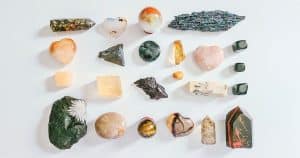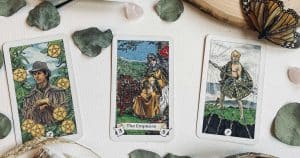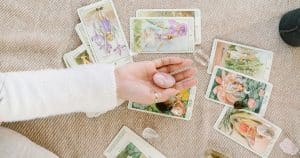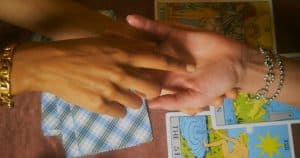When it comes to love and romance, words sometimes can’t express the passion and emotional connection we feel as well as symbols do. Symbols for love and romance are everywhere we look: in fine art, on graffiti walls, billboards, greeting cards and the clothes we wear. Hearts, flowers, gems, gods and other love symbols conjure up emotional qualities of love in our minds and trigger associative memories that deepen our experience of the love we feel for someone. The meaning of a symbol may be simple or it may have a deeper spiritual esoteric meaning that greater defines loves qualities.
Symbols transmit consciousness and meaning and when it comes to love there are an array of symbols that help us remember: it’s time to express that love to our romantic partner.
Cupid
The personification of desire and courtship, Cupid is the Roman winged god depicted with his bow and quiver of arrows. Cupid is known to the Greeks as Eros, born out of the chaos (void) alongside his sister Aphrodite. In the Roman version he is born from the union of Mars and Venus. Cupid was often shown blindfolded in art to symbolize love’s blindness. The notion that a pierce from Cupid’s arrow will render the victim hopelessly in love comes from the myth of Cupid and Psyche: When ordered by Venus to make her rival, Psyche, fall in love with the vilest thing in the world, Cupid is accidently scratched by his own golden arrow and falls hopelessly in love with Psyche visiting her each night while she slept.
Diamonds
Diamonds are worn to symbolize eternal love. The Greeks believed diamonds were tears of the gods and the Romans believed they were splinters of fallen stars. The first diamond engagement ring can be traced to the 15th century, when the Archduke Maximilian of Austria gave a diamond ring to Mary of Burgundy in 1477. In the 19th century, Napoleon gave his wife Marie Louise an exquisite diamond necklace as a token of his appreciation upon the birth of their son. The most publicized romantic diamond gift, a 33-carat diamond worth $9 million, was given to Elizabeth Taylor by Richard Burton.
Heart Shape
Nothing says “I love you” more simply than the heart shape. But where did this stylized image originate? No one really knows for sure. However, the earliest usage of the image appears to have been stamped on minted coins by the Cyrenes in the 7th century B.C. The image was actually of the heart shaped seedpod of the now extinct silphium plant, which was used as a seasoning and was reputed to be a birth control agent. The theory is that the heart shape was first associated with sex, and later became associated with love. The heart shape later proliferated with the popularity of the exchange of Valentines in the Victorian era in England.
Tulips
As the 11th wedding anniversary flower, a tulip’s velvety black center represents a lover’s heart, darkened by the heat of passion. A Turkish legend adds further meaning to the red tulip’s symbolism. The legend goes that a prince named Farhad fell in love with a maiden named Shirin. When Farhad learned that Shirin had been killed, he was overcome with sorrow and in desperation rode his horse over the edge of a cliff. The red tulip sprung from each drop of his blood, giving the red tulip the meaning “perfect love.”
Roses
Emma Goldman said, “I’d rather have roses on my table than diamonds on my neck.” Since time immemorial, the rose has been the most appreciated symbol of divine and romantic love, beauty and perfection. Each color variety adds further meaning as a romantic symbol: yellow signifies a joyful love; red represents passion and immortal love; and pink symbolizes first love.
Doves
The cooing and bowing courting ritual of doves inspire lovers. Doves have long been considered a symbol of faithful and eternal love because they mate for life. And if one dove is separated from its mate through death, the other will not mate again. Depictions of two doves together symbolize everlasting love.
Maple Leaves
To the Chinese and Japanese cultures, the maple leaf is the insignia of lovers. Like the syrup derived from the tree, the maple leaves serve as love symbols because they express the sweetness and wonder of love in daily life. North American settlers used to place the maple leaves at the foot of their beds to encourage sexual pleasure and a peaceful slumber.
Claddagh Symbol
The two tiny hands holding a crowned heart motif called the Claddagh symbol has been fashioned into rings for centuries and given as a token of love. The folklore of the first Claddagh ring is exceptionally romantic. A fisherman named Richard Joyce worked in the Moorish lands, far from his native Galway in Ireland. The legend goes that he was kidnapped by pirates and forced to work for a goldsmith. As a result, he became a skilled craftsman. During his slavery, he never forgot his true love, Margaret. He crafted a special ring to illustrate his love and loyalty to her. When Joyce was freed many years later, he returned to Galway, Ireland, and reunited with Margaret, giving her the ring.
Apples
A symbol of sexual ecstasy, fertility, wisdom, abundance and love, the apple holds esoteric meaning for its mystical and magical properties. At the wedding of Zeus and Hera, Gaia supplied apples to Hera to signify lasting love and union. Dionysus, the Greek god of wine, wooed Aphrodite by offering her apples and won her love. Split apart, the apple resembles the image of vulva, signifying beauty and feminine love.
Celtic Love Knot
The interlacing design of the Celtic Love Knot, having no beginning and no end, stands for the continuity of everlasting love and the intertwining and binding of two souls. Christianity adapted the Celtic symbolism incorporating the designs into high crosses and included them in religious manuscripts such as the Book of Kells. Although the ancient Celts did not record the meanings behind the designs, scholars speculate that the symbols represented basic principles of life, mankind and spirituality. Three knots laced together symbolized the tri-unity of lovers, God, man and woman.
Kokopelli
The Native American “Pied Piper”, Kokopelli is a trickster and fertility symbol associated with courtship. He is depicted with a plumed headdress, exaggerated genitalia and is walking while blowing his flute. He often plays a part in the Hopi rituals relating to matrimony and is sometimes depicted with his consort, Kokopelmana. As a custom, the love-flute was used by a man to attract a maiden. When the two were married, the man would destroy his flute, never to play again.
Other Love Advice Articles by Ariadne Green
- Will He Know We’re Made for Each Other?
- Making the Most of Your Relationship Mistakes
- Dreams of a New Lover
- Righting Your Relationship Mythology
- Giving Your Relationship Soul
- How Do I Tell Him It’s Over?
- Can Soulmates Be Just Friends?
- 8 Signs You Love Him Too Much
- Yin Meets Yang
- Does Age Difference Matter in Love?
- Which Soulmate Goddess Are You?
- The Soulmate Holy Grail
- Are Memories Interfering with Your Relationship?
- Soulmate Obsession
- It’s All About Love
- 5 Signs That You Fear Abandonment
- Can I Find My True Soulmate Online?
- Is It the Real Thing or Just a Romantic Fling?
- He’s My Dad All Over Again
- Has Your Prince Charming Lost His Directions to the Ball?
- Forbidden Love: When Family Objects
- Why Matches Made in Heaven Sometimes Fail
- A Five-Step Formula to Appreciating Your Soulmate’s Differences
- Manifesting Your Destiny With Your Soulmate
- Love Sometimes Requires Letting Go
- Fact or Fiction: There’s Only One Person in the World Meant for You












